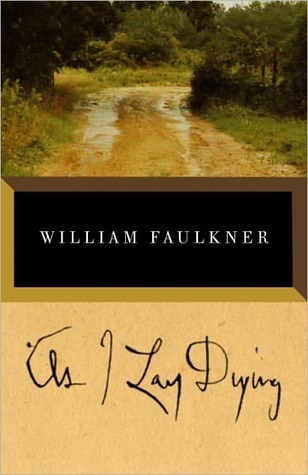What do you think?
Rate this book


288 pages, Paperback
First published January 1, 1930
It is easy to be confusing. It is easy to write something beautiful and understandable for yourself. It's hard to write universal words which we can all connect.
The quilt is drawn up to her chin, hot as it is, with only her two hands and her face outside. She is propped on the pillow, with her head raised so she can see out the window, and we can hear him every time he takes up the adze or the saw. If we were deaf we could almost watch her face and hear him, see him. Her face is wasted away so that the bones draw just under the skin in white lines. Her eyes are like two candles when you watch them gutter down into the sockets of iron candle-sticks. But the eternal and the everlasting salvation and grace is not upon her.
I had a nightmare once I thought I was awake but I couldn’t see and couldn’t feel I couldn’t feel the bed under me and I couldn’t think what I was I couldn’t think of my name I couldn’t even think I am a girl I couldn’t even think I nor even think I want to wake up nor remember what was opposite to awake so I could do that I knew that something was passing but I couldn’t even think of time then all of a sudden I knew that something was it was wind blowing over me it was like the wind came and blew me back from where it was I was not blowing the room and Vardaman asleep and all of them back under me again and going on like a piece of cool silk dragging across my naked legs.
Back running, tunnelled between the two sets of bobbing mule ears, the road vanishes beneath the wagon as though it were a ribbon and the front axle were a spool.
Faulkner's not even trying to make anyone talk realistically. He's about something, I guess - lending epic weight to lifesize events - and I even kinda like it... but it's still basically ridiculous.
It is as though the dark were resolving him out of his integrity, into an unrelated scattering of components - snuffings and stampings, smells of cooling flesh and ammoniac hair, an uncoordinated whole of splotched hide and strong bones within which, detached and secret and familiar, an is different from my is.

I aint so sho who's got ere a right to say when a man is crazy and when he aint. Sometimes I think it aint none of us pure crazy and aint none of us pure sane until the balance of us talks him that-a-way. It's like it aint so much what a fellow does, but it's the way the majority of folks is looking at him when he does it.

“Dios sabe ver dentro de los corazones. Si es voluntad suya que no pensemos todos igual acerca de su novela, no soy yo quién para discutir los divinos designios.”Una familia, cumpliendo a regañadientes el deseo de la madre de ser enterrada en su pueblo natal (quiere yacer lo más lejos posible de su marido y sus hijos), emprende el viaje en un carro destartalado a cuestas con el ataúd que durante días el hijo ha construido bajo la vigilante mirada de su madre moribunda. El viaje y sus grotescas y accidentadas peripecias mientras transportan el ataúd cada vez más pestilente serán la novela. El resultado, la venganza de una mujer por la vida que le dio su marido.
“Soy un elegido de Dios, pues Él castiga a aquel a quien Él ama. Pero que me aspen si es que Él no ha escogido, por lo que se ve, una manera harto extraña de demostrar su amor.”Ya me dirán ustedes si un escritor mucho más adecuado para contar esta historia no habría sido Erskine Caldwell, que además era muy admirado por el propio Faulkner. Quienes hayan leído sus obras, que desde aquí recomiendo, sabrán a qué me refiero. Caldwell, con la misma mala leche que se estiló Faulkner al escribir su obra, aunque seguramente con una menor exhibición formal y quizás con una estructura más convencional (la novela la forman cincuenta y nueve capítulos narrados por quince personajes distintos, incluida la madre muerta, en una especie de monólogo interior) pero con muchísima más gracia y algo más de cariño hacia sus personajes, habría construido una fantástica comedia, una triste comedia, y un retrato insuperable de estos campesinos pobres e ignorantes, ingenuos, mezquinos y egoístas que forman la familia protagonista.